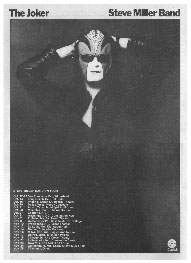![]()
  |

The Joker
Steve Miller Band
Capitol SMAS 11235
Released: October 1973
Chart Peak: #2
Weeks Charted: 38
 Steve Miller is responsible for three of the best and one of the worst albums I own. Miller's recent Recall the Beginning, a Journey to Eden was a confessional work so full of self-awareness I wondered whether he was about to regain the imaginativeness he'd shed over the course of his three preceding albums. Unfortunately his new LP, The Joker, is a lazy slide back into the empty posturing that has marked the second half of Miller's career.
Steve Miller is responsible for three of the best and one of the worst albums I own. Miller's recent Recall the Beginning, a Journey to Eden was a confessional work so full of self-awareness I wondered whether he was about to regain the imaginativeness he'd shed over the course of his three preceding albums. Unfortunately his new LP, The Joker, is a lazy slide back into the empty posturing that has marked the second half of Miller's career.
While not as embarrassing as Rock Love, it is disturbing because of his strained references to the personas (like the space cowboy and the gangster of love) that dotted his early music. The title song (which may ironically turn out to be his biggest single) is little more than a series of references to his past, coupled with catchy vocal harmonies and bass line.
 Click image for larger view. |
The last quarter of the album redeems itself somewhat. That section consists of three credible and well-performed songs: the workhorse country blues, "Come On in My Kitchen," and two originals, "Evil" and "Something to Believe In." Although the first two are live performances, Miller's voice is perfectly controlled and clear. "Something to Believe In" is marked by a guitar intro lifted intact from the Association's "Never My Love," the ethereal pedal steel of Sneeky Pete, and some of Miller's best singing.
It has the intimacy and credibility so lacking in the rest of the album. As the title and cover art suggest, Miller is attempting here to disguise rather than to reveal.
- Bud Scoppa, Rolling Stone, 12/20/73.
Bonus Reviews!If I remember correctly, the Steve Miller Band is a white blues group that grew overly eclectic, disbanded, then re-formed, and has now found its original fans and newcomers to welcome it back.
This new album starts off well with "Sugar Babe," which sounds Beatle-ish and has a lot of jumpy nerve. But then there's "Mary Lou," originally recorded by Ronnie Hawkins in the 1950's, when his backup group included future members of the Band (remember them?). Miller's version misses all the built-in clues the tune has as to how it should be played, and it falls flat. He does better on "Your Cash Ain't Nothin' but Trash," which, with its friendly vaudeville jive, seems to be out of the (black) 1940's. It was written by Charles Calhoun, which seems to be a name I should remember... wait! I find, on consulting my stacks of shellacs and towers of vinyl, that the song was cut by the Clovers, one of the early r-&-b groups, back in 1954. The second side of the album contains Miller originals, with the exception of Robert Johnson's "Come On in My Kitchen," recorded live by Miller as a solo at a club date.
As a white blues band, Miller's is pretty good. I am ambiguous about white blues bands, though, for the following reasons: (1) I heard black blues when quite young so that (2) white blues bands can't be, for me, as good as the originals, yet (3) blues are anybody's property, since white folks get unhappy too, and (4) some individual musicians in white blues bands are better than their black idols, and besides, (5) blues are so much fun to play; but (6) I can't join in the general huzzahs for white blues bands because I think over the last seven years, despite the rediscovery of black blues masters, white blues bands have gotten the devotion that black blues bands should have had, but then again, (8) wise up, kid, and (9) what does it matter so long as good music gets played well?
What the Miller band can do for blues, they do; what they can't, they can't. In that regard, they're like most white blues outfits. And (10) doggone it, that's the way it is.
- Joel Vance, Stereo Review, 5/74.
As a spacey rock prophet he's terrible (who isn't?). As a blues singer he's incompetent (I wouldn't come on in his kitchen for a glass of water). But as a purveyor of spacey pop-rock blues, he has his virtues. Question: what the hell is "the pompitous of love"? The Medallions wouldn't tell me. B-
- Robert Christgau, Christgau's Record Guide, 1981.
While not as strong as some of his earlier work, The Joker's title cut (built from a simple guitar riff) was Miller's first huge number one single. "Sugar Babe" and "Something to Believe In" were also highlights. Nevertheless, Miller's focus on basic catchy material laid the groundwork for his incredibly successful late-'70s albums. * * *
- Rick Clark, The All-Music Guide to Rock, 1995.
![]() Reader's Comments
Reader's Comments
No comments so far, be the first to comment.
